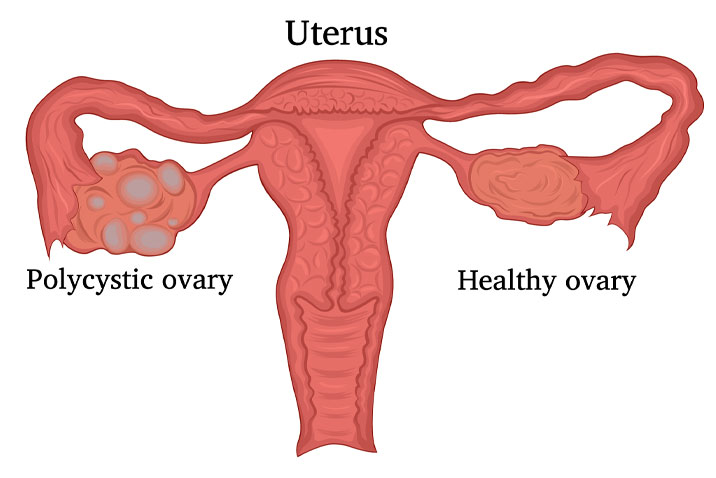Polycystic ovarian syndrome (PCOS) is the condition brought on by an excess production of male hormones by the ovaries, which are an organ responsible for producing and releasing eggs. Your ovaries create abnormally high levels of androgens if you have PCOS. Your hormones related to reproduction become unbalanced as a result.
People with PCOS commonly experience irregular menstrual cycles, missed periods, and unexpected ovulation as a result. Lack of ovulation (anovulation) can cause little cysts to form on your ovaries (fluid-filled sacs) . However, despite the name “polycystic,” you do not need to have cysts on your ovaries to have Polycystic ovarian syndrome.
One of the most frequent reasons for female infertility is PCOS. Additionally, it can make you more susceptible to developing additional medical problems. Depending on your symptoms and if you have plans for having children, your doctor can treat PCOS.
What causes PCOS?
Doctors are unsure of the precise cause of PCOS. They contend that excessive quantities of male hormones inhibit the ovaries from regularly creating eggs and hormones. Excess androgen production has been associated with genes, insulin resistance, and inflammation.
- Gene
According to gene studies, PCOS runs in families. There are probably multiple genes involved in the condition, not just one. - Insulin resistance
Women with PCOS can develop insulin resistance in up to 70% of cases, which prevents their cells from adequately utilizing insulin. The pancreas secretes the hormone insulin to facilitate the body’s utilization of dietary sugar for energy. The body requires more insulin when cells can’t adequately use it. To make up for this, the pancreas produces extra insulin. Extra insulin triggers the ovaries to produce more male hormones. The main contributor to insulin resistance is obesity. Your risk of developing type 2 diabetes can be increased by both weight and insulin resistance. - Inflammation
PCOS patients frequently have higher than average amounts of inflammation in their bodies. Inflammation can also be exacerbated by being overweight. Studies have connected elevated testosterone levels with excessive inflammation.
What are the Risks for PCOS?
If your mother or sister have PCOS, you might be more prone to it as well. If you are fat or have insulin resistance, you may also be more likely to have it.
What are the Symptoms of PCOS?
PCOS symptoms could include:
- Missed periods, irregular cycles, or exceptionally light periods
- Ovaries that are large or have many cysts
- Infertility
- Small bits of extra skin around the neck or under the arms (skin tags)
- Patches of thick or dark skin behind the breasts, in the armpits, and on the back of the neck
- Gaining weight, especially around the abdomen
- Oily skin or acne
- Baldness with a male pattern or thinning hair
Diagnosis AND Tests
The majority of the time, a physical examination is all that is required to determine PCOS. To assist with the diagnosis, they could do an ultrasound or order blood tests.
Your healthcare professional will:
- Discuss your symptoms and medical background with you.
- Inquire about the medical history of your family.
- Consider your blood pressure and weight.
- Examine yourself physically, paying close attention to any skin tags, hair loss, acne, or abundant facial hair.
- Perform a pelvic exam to check for enlarged ovaries or other growths in your uterus.
- Request blood tests to examine your glucose and hormone levels.
- Use a pelvic ultrasound to assess the thickness of your uterus’ lining and look for cysts in your ovaries.
Typically, PCOS is diagnosed if at least two of the following are present:
- Missing or irregular periods
- Symptoms of too much androgen example acne or excessive hair growth or a blood test demonstrating elevated amounts of androgen.
- One or both ovaries with cysts. Cysts do not develop in many persons.
How can PCOS get Treated?
A variety of factors affect how PCOS is treated. Your age, the severity of your symptoms, and your general health are a few examples of them. Whether you intend to get pregnant in the future may also affect the type of treatment you receive.
If you do intend to get pregnant, you might receive the following treatments:
- An adjustment in diet and exercise: You can lose weight and lessen your symptoms by eating well and engaging in greater physical activity. They may aid in ovulation, decreased blood sugar levels, and improved insulin sensitivity in your body.
- Ovulation-inducing drugs: The ovaries can release eggs normally with the aid of medications. These drugs come with certain hazards as well. They may raise the possibility of multiple births (including twins). They can also stimulate the ovaries excessively. At this point, the ovaries overproduce hormones. It may result in symptoms including pelvic pain and bloating in the abdomen.
If childbirth is not in your plan, you might receive the following treatments:
- Contraceptive tablets: These aid in regulating menstrual periods, bringing down testosterone levels, and clearing up acne.
- Diabetes medication: To reduce insulin resistance in PCOS, this is frequently utilized. Additionally, it might aid in lowering testosterone levels, reducing hair growth, and promoting more frequent ovulation.
- A modification in diet and physical activity: You can lose weight and lessen your symptoms by eating well and engaging in greater physical activity. They may aid in ovulation, decreased blood sugar levels, and improved insulin sensitivity in your body.
- Medications to treat other symptoms: Some medications can help reduce hair growth or acne.
Managing PCOS
Weight gain, hair growth, and acne are a few physical signs of PCOS that some women battle with. You might feel more confident in your appearance after receiving cosmetic procedures like electrolysis and laser hair removal. Discuss the best strategies to treat the symptoms that affect you with your healthcare professional.
